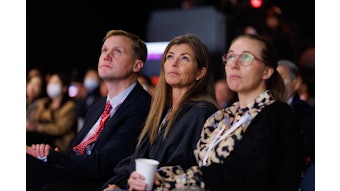#AHA22 Symposia Schedule
Lineup of unofficial programming schedule for Scientific Sessions 2022 in Chicago.

Friday, Nov. 4
Dinner and Registration: 6- 6:30 p.m.
Symposia: 6:30-8 p.m.
Case Challenges With Antiplatelet Therapy
Marriott Marquis Chicago | Ballroom: Great Lakes FG
Dual antiplatelet therapy (DAPT) remains the cornerstone of therapy for the prevention of ischemic complications after PCI. However, the reduction in risk of ischemic events with DAPT comes at a cost of increased bleeding; patients at high bleeding risk (HBR) may be effectively and safely managed with antiplatelet therapy bleeding risk-reduction strategies. Conversely, other patients at high ischemic risk after full-term DAPT may be candidates for either extended DAPT or dual pathway inhibition (DPI), consisting of aspirin (ASA) plus factor Xa inhibition. In this program, experts in the use of antiplatelet therapy (Program Chair Dr. Deepak Bhatt, with faculty members Dr. Marc Bonaca, Dr. Roxana Mehran, and Dr. Philippe Gabriel Steg) will describe best practices for assessing ischemic risk and bleeding risk after PCI, and in three challenging cases, supported by current clinical trial evidence, identify patients for bleeding risk reduction strategies with antiplatelet therapy, and patients for consideration of prolonged dual therapy.
Register online at www.symposiareg.com/22211S
Saturday, Nov. 5
6-7:30 a.m.
Making the Call in Heart Failure: Multidimensional Outcomes With S GLT2 Inhibitors
Marriott Marquis Chicago
Heart failure medicine is dynamic, with recent approvals for use of SGLT2 inhibitors, and updated recommendations for definition, staging and classification of heart failure. As heart failure therapies overlap into other specialties, it is more important than ever to use a patient-centered, multidisciplinary care team model. In this 90-minute Call-a-Colleague presentation, three experts will discuss the new consensus recommendations for heart failure and the evidence for using SGLT2 inhibitors in patients with different classes of heart failure as well as comorbidities. To illustrate how to individualize treatment regimens and the nuances of heart failure care, they will call in specialist colleagues for consults about practical considerations for prescribing SGLT2 inhibitors.
Registration: https://www.exchangecme.com/HFChicago22
6-7:30 a.m.
Breaking Through the Resistance: Innovations Surrounding Resistant Hypertension
Marriott Marquis Chicago
Great Lakes Ballroom AB, Level 2
When patients present with resistant hypertension, clinicians aim to stabilize blood pressure by adding or replacing traditional agents, then hope that noncompliance and reduced adherence won’t further complicate management. Fortunately, new and effective pharmacologic treatments, device therapies and multidisciplinary team approaches are rapidly changing outcomes. This CE-certified symposium will assess diagnostic delay consequences, traditional treatment shortfalls, dual endothelin-receptor antagonists and why guidelines don’t keep pace with real-world clinical practice.
6-7:30 a.m.
Updating Our Cardio-Oncology Skills in the Cancer Immunotherapy Era: Team-Based Strategies for Risk Assessment, Diagnosis and Management of Myocarditis and Other Cardiac Immune-Related Adverse Events
Hyatt Regency McCormick Place
Prairie Room, Level 2
Immune checkpoint inhibitors (ICIs) have had a strikingly positive impact on the treatment of a range of cancer types by blocking intrinsic downregulators of the immune response to increase antitumor immunity. A number of ICIs and ICI based combinations have been approved for use in many solid and liquid malignancies, and intense research efforts promise to expand their role in advanced cancers and early-stage, curative-intent settings. While immunotherapy has become a pillar of cancer treatment and is considered safe, ICIs are associated with a spectrum of unique toxicities termed immune related adverse events (irAEs). These irAEs can affect any organ system in the body, including the heart and cardiovascular system, occur at any point during or after treatment, and vary in presentation from mild to severe, and sometimes life threatening. Cardiac pathology attributed to irAEs include myocarditis, cardiomyopathy, pericardial disease, arrhythmias and conduction disease, impaired ventricular function with heart failure and vasculitis. Autoimmune myocarditis is the most common and best characterized cardiac irAE to date. This PeerView Live Clinical Consults cardio-oncology symposium will provide essential guidance for prompt identification and initiation of treatment of irAEs. In the current era of cancer immunotherapy, health care professionals must develop a high level of vigilance and be able to correctly and rapidly manage and monitor patients with cancer-exhibiting symptoms of possible cardiac irAEs to ensure the best possible outcomes. The expert faculty will present management algorithms, real-world case scenarios and practical challenges related to multidisciplinary coordination of care to improve collaborative mitigation of cardiac irAEs.
6-7:30 p.m.
How I Think, How I Treat: Cardiology-Focused Perspectives on Using SGLT2 Inhibitors to Optimize Outcomes in Patients With Heart Failure
Marriott Marquis Chicago
Grand Horizon Ballroom B, Level 4
SGLT2 inhibitors have a newly established role in the foundation of guideline-directed medical therapy for patients with heart failure (HF). As the understanding of these agents has evolved beyond their use in diabetes care, SGLT2 inhibitors have earned a place as vital pharmacotherapy in the fight against heart failure. Landmark clinical trials of SGLT2 inhibitors have shown clinically relevant and statistically significant reductions in hospitalization for HF events, major adverse cardiovascular events and kidney events. In PeerView’s latest CME-certified in-person and virtual event, experts reveal their personal approach to how they think about and treat patients with HF using SGLT2 inhibitors. Follow along from the beginning of the treatment journey with the identification of patients who are most likely to benefit. Then, learn how to take action and apply the evidence for using SGLT2 inhibitors in patients with HFrEF, HFpEF or acute HF. Finally, shift your focus to patient-centered care by reviewing strategies and guidance for integrating SGLT2 inhibitors into your practice.
6-7:30 p.m.
IV Iron Expert Exchange: Data-Driven Debates on the Revolutionary Role of IV Iron in Heart Failure
Marriott Marquis Chicago | Grand Horizon Ballroom G, Level 4
For more information and to register, visit: www.ceconcepts.com/content/iv-iron-expert-exchange
6:30- 8 p.m.
Managing Patients With Recent Worsening Heart Failure With Reduced Ejection Fraction: Keys to Successful Outcomes
Marriott Marquis Chicago | Ballroom: Great Lakes FG
Patients with heart failure with reduced ejection fraction (HFrEF) and recent worsening heart failure (WHF) have high rates of death and hospitalization despite the use of guideline-directed medical therapy (GDMT). New and emerging novel agents, with distinct mechanisms of action, have demonstrated improved clinical outcomes in these patients, and clinicians must be able to not only identify appropriate patients for these therapies—personalizing treatment based on the patient’s profile—but also utilize these therapies effectively in practice. Therefore, in this program, HF experts (Chair Dr. John Teerlink, with faculty members Dr. Nancy Albert, Dr. Barry Greenberg, Dr. Scott Solomon and Dr. Jane Wilcox) will explain the challenges in managing patients with HFrEF and recent WHF, identify the roles for new and emerging therapies and describe best practices to prevent adverse HF-related events.
Register online at www.symposiareg.com/22210
7:30-9 p.m.
From Cell to Bedside—Transforming the Care of the Cardiac Patient
Sable Hotel-Navy Pier | Grand Horizon Ballroom, Section EF
Educational talks on the state-of-the-art and novel approaches to the care of patients with heart disease.
Sunday, Nov. 6
6-7:30 a.m.
Real-World Perspectives on the Under-Diagnosis of Heart Failure in the U.S.
Marriott Marquis Hotel | Grand Horizon Ballroom EFG
This session will discuss the underdiagnosis of heart failure (HF) and its impact on patients in the real-world setting. The session will open with a compelling story from a patient turned advocate who has lived through challenges in diagnosis and treatment for heart failure and related complications for 20 years. The program will continue with a real-world data presentation on the underutilization of diagnostic tools to identify HF in the U.S. This will be followed by an insightful panel discussion among several heart failure specialists and a patient advocate to illuminate gaps, challenges and opportunities in the diagnosis of heart failure.
6-7:30 p.m.
Ultrasound Renal Denervation (uRDN) —Leading With Evidence and Preparing for What Comes Next
Hyatt Regency, McCormick Place Jackson Park (street level in the west building of the convention center)
Join ReCor Medical’s dinner symposium to learn about ultrasound renal denervation therapy for treatment of uncontrolled hypertension.
6-7:30 p.m.
Advances in Imaging and Targeted Management for Cardiac Inflammation: Clinical Progress in Pericarditis
Hyatt Regency McCormick Place | Prairie Room
Pericarditis is a painful and debilitating autoinflammatory cardiovascular disease (CVD). It is the most common disease of the pericardium, comprising nearly 5% of emergency department visits with patients who present with nonischemic chest pain. Though generally self-limiting, pericarditis can come with a significant risk of acute complications and recurrences. The recurrence rate after an initial episode of pericarditis ranges from 15% to 30%, and may increase to 50% after a first recurrence in patients who are not treated appropriately. Join our panel of experts for an interactive CME-certified symposium focused on enhancing clinician understanding of the clinical and humanistic burden of recurrent pericarditis, assessment strategies to facilitate early recognition and advances in targeted treatment strategies, with the goal of treating symptoms early and appropriately, reducing recurrence and optimizing patient outcomes in patients with pericarditis.
For more information and to register, visit: www.medscape.org/symposium/advances-recurrent-pericarditis
6-7:30 p.m.
Transforming the Treatment of Hypertrophic Cardiomyopathy: Key Updates on Sarcomere-Directed Therapies
Marriott Marquis Chicago | Great Lakes Ballroom
Hypertrophic cardiomyopathy (HCM), the most common inherited cardiac disorder, is defined by the presence of increased left ventricular (LV) wall thickness that is not caused by secondary factors. Despite this high prevalence, the majority of individuals with HCM are undiagnosed and untreated. HCM is a disease of the sarcomeres, which are responsible for contraction within cardiac myocytes. Physicians must be able to understand the role of sarcomere dysfunction in the development of HCM and how cardiac myosin inhibitors disrupt these pathological processes. Additionally, they must be made aware of emerging clinical data surrounding cardiac myosin inhibitors to provide optimal care to their patients. This Town Hall does just that. We hope you join us and look forward to sharing this exciting information.
For more information and to register, visit: www.medscape.org/symposium/hcm-2022
7:30-9 p.m.
Expert Perspectives and Discussions: What You Need to Know About Optimizing Cardiorenal Outcomes With Novel Nonsteroidal MRAs
Marriott Marquis Chicago | Great Lakes EF
Join George Bakris alongside Pam Taub, Slyvia Rosas and Rajiv Agarwal to discuss the latest in cardiorenal outcomes with novel nonsteroidal MRAs.
Key reasons to attend this CME Dinner Symposium:
- Earn up to 1.5 CME/CE credits
- Learn more about the importance of chronic kidney disease and type 2 diabetes as major drivers of cardiovascular morbidity and mortality
- Be up-to-date about the data with novel nonsteroidal MRAs in cardiorenal risk reduction, and how this new approach fits in with existing treatment options
- Hear from top experts on how to apply this evidence to reduce the risk of cardiovascular and renal adverse events in patients with chronic kidney disease and type 2 diabetes
Reserve your seat at: https://www.cardiometabolichealth.org/aha2022
7:30- 9 p.m.
- JAMA Network Reception (Invitation-only event)
- Hyatt Regency Chicago | Crystal C Ballroom
A reception with the editors of JAMA, JAMA Cardiology, JAMA Internal Medicine and JAMA Network Open.
Monday, Nov. 7
6-7:30 a.m.
Personalizing the Management of Hyperlipidemia: Addressing Unmet Needs Among High-Risk Patients With Atherosclerotic Cardiovascular Disease With Novel Lipid-Lowering Therapies
Location Pending
LDL-C reduction with statin therapy is the cornerstone treatment for dyslipidemia, yet many patients are unable to attain recommended lipid goals with these oral therapies alone. PCSK9-targeting therapies, monoclonal antibodies and small interfering RNA have been shown to reduce LDL-C levels by half, but questions surround the use of these agents and the outcomes associated with their use. In this PeerView Live MasterClass and Practicum, leading experts will discuss the latest data for these newer targeted strategies and offer evidence-based strategies to better individualize care to improve clinical outcomes, especially in patients with high ASCVD risk.











